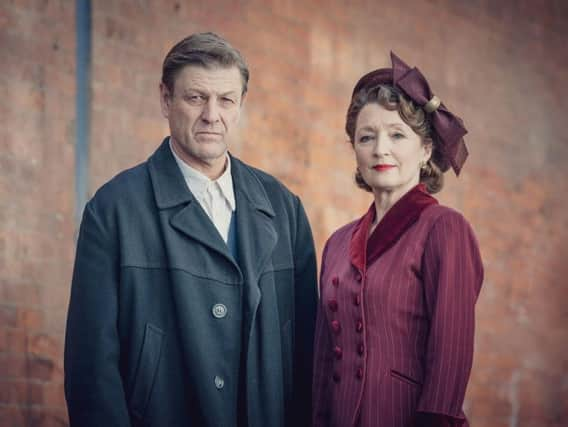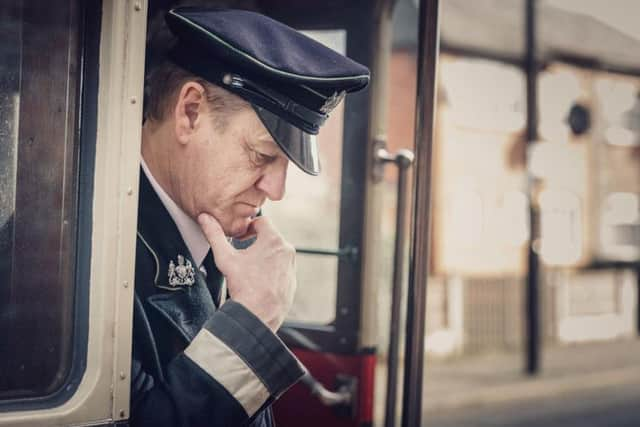Sean Bean plays a traumatised war veteran in major new BBC drama World on Fire - we talk to the Sheffield-born star


So, it’s understandable that for his latest show, World On Fire, he was keen to check with the writer – Bafta-winning Peter Bowker – that he would survive the first series.
“I think I did have a telephone conversation; ‘I don’t die, do I?’,” the 60-year-old recalls with a light chuckle.
“And they said, ‘No, no, no, you’re all right!’”


Advertisement
Hide AdAdvertisement
Hide AdIn the seven-part BBC One war drama, Bean plays Born in the Handsworth area of Sheffield, few actors have stayed as true to their roots as he has and his distinctive accent has starred in some of the most popular movies and television shows of the last 25 years.
Sir Patrick Stewart is back in Huddersfield to talk about his remarkable careerBean joined his father’s firm as a welder before starting a drama course, getting a scholarship to the Royal Academy of Dramatic Art in 1981 from where he graduated two years later. The ardent Sheffield United fan rose to prominence with parts such as Mellors in the 1993 TV mini-series Lady Chatterley’s Lover and the eponymous hero Richard Sharpe in the TV adaptation of Bernard Cornwell’s bestselling books set during the Napoleonic Wars – with the latter show making him a household name.
He says his latest role in the seven-part BBC One war drama as working-class man Douglas Bennett is unlike any character he’s played in the past. Now a bus conductor living in Manchester with his two grown-up kids, Douglas witnessed a lot of horror and bloodshed during the First World War. As a result, when the Second World War begins, he is “a conscientious objector, a pacifist”.
He is also, Bean suggests, “a man who was suffering really psychologically from the past, trying to keep a hold on his life”.
Advertisement
Hide AdAdvertisement
Hide Ad“These flashbacks come upon him, these memories, these horrible nightmares that he just can’t get out of his head, and he’s trying to deal with it himself, on his own really, as many men did after the First World War,” he elaborates.
How they took Sharpe from script to screen“They didn’t get help from hospitals or societies or the government; they were very much seen as weaklings or men who were shirking or trying to dodge things. But they were actually men who were so shocked and so damaged that they weren’t pretending.”
His voice soft and quiet, the gentle star adds: “Today it would be mental illness; it’s well documented and it’s addressed. But then, they just thought you were weak, you weren’t strong, you weren’t a man. He is a man, and he was a strong man, until he went through this and he’s kind of broken.”
The emotive series, which was partly filmed in Yorkshire at the Braime Pressings factory in Leeds, looks at
Advertisement
Hide AdAdvertisement
Hide Adhow the first year of the war affected several different ordinary people in various countries – Britain, Poland, France, Germany and the United States.
Other intertwining stories we follow include that of Douglas’ children, Lois (played by Julia Brown) and Tom (Ewan Mitchell).
“He was a loving father, loving husband,” notes Bean, who married his fifth wife in 2017, and has three children from his previous marriages.
“The war threw that everywhere; his wife died soon after and he was kind of living it with it on his own. He wasn’t getting any help and he’s going through these emotions, trying to get these horrific experiences.
“He has to live with them for the rest of his life.
What research did he do for the part?
Advertisement
Hide AdAdvertisement
Hide Ad“Well, I read up about it and I watched documentaries. But I suppose I’ve always had an interest in it, the First and Second World War.
“I’ve played a lot of soldiers over the years and I’ve talked to a lot of people involved especially in the Falklands.
“In the series Sharpe, I remember we had men from the Falklands who had lost legs and we used them for a scene we shot in the hospital in Greenwich, in the Peninsular War.
“That was over a period of time, and we were chatting.
“There were experiences that had been told to me by those guys and so it was a matter of just dredging those stories back up again, a bit of talking to the directors and writers and a bit of research.
Advertisement
Hide AdAdvertisement
Hide AdBrian Blessed on Flash Gordon, Patrick Stewart and his passion for our environment“It’s a very personal thing, because it’s how you portray it and how you try to show the damage that has been done.
“So it’s a matter of choice of how far you go and how your body reacts and how your body follows your brain to demonstrate in your acting.”
Bean, whose other recent TV roles include Broken, Medici and Curfew, admits the filming process for World On Fire was particularly intense.
“It wasn’t where you went to work and said, ‘Hi’ with other characters,” he says, imitating a cheerful voice. “It was a man who was kind of trapped in his house, in his kitchen with his family, and he’s claustrophobic and it was intense, and he was putting on this front. He was trying to be all right for his kids – he was really falling apart inside.
Advertisement
Hide AdAdvertisement
Hide Ad“That was very interesting to play. Not necessarily enjoyable, but fascinating to explore.”
As well as Bean, other big names on the cast list include Hollywood star Helen Hunt and Oscar-nominee Lesley Manville.
“Douglas and Robina [Lesley’s character] struck up quite a friendship. [They’re] from totally different backgrounds and walks of life – he’s a working class bus conductor who’s served in the First World War, she’s a rather posh, gentrified lady of the manner. Because of the relationship between my daughter and her son, we’re thrown together and that’s quite a fascinating relationship.”
Discussing the appeal of the project, Bean affirms he was really pleased with how the story deals with people from different countries, walks of life and classes.
Advertisement
Hide AdAdvertisement
Hide Ad“It just gives it a bigger feel, in Warsaw, in Berlin in the snow, in Paris... All these people come together in the unlikeliest of circumstances.
“I suppose it’s the first time that all the European people have become so close, because of this common enemy, and had to be thrown together, and how well we all seem to like each other. Now, we don’t!”
The BBC are promising viewers “a series that takes us across the first year of the war, from ordinary life in Manchester to the beaches of Dunkirk, getting right under the skin and into the hearts and minds of those living their lives during this extraordinary time as they grapple with the unthinkable: a world in flames”.
When it comes to reprising the role of Douglas in the future, (the plan is to do a different series for each year of the war), it’s definitely something that Bean would be up for.
Advertisement
Hide AdAdvertisement
Hide Ad“It’s such a good series,” he gushes. “It’s something that’s just unfolding at the moment, and all doors are left open. There’s a lot more story to tell.”
World On Fire starts on BBC One on Sunday, September 29.